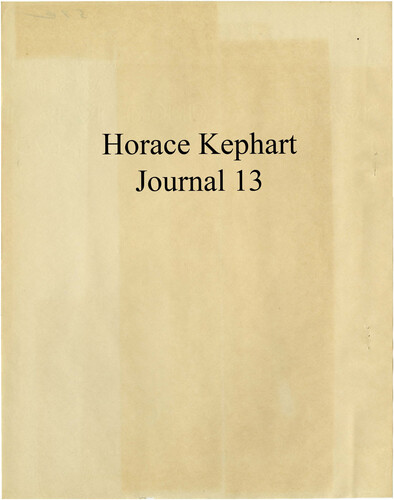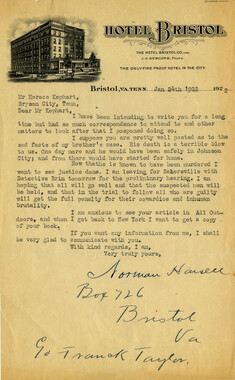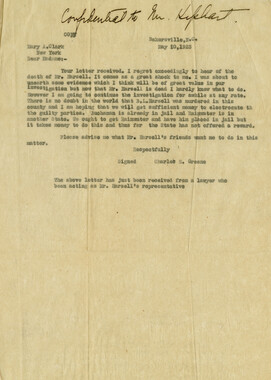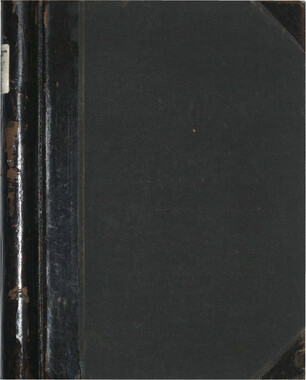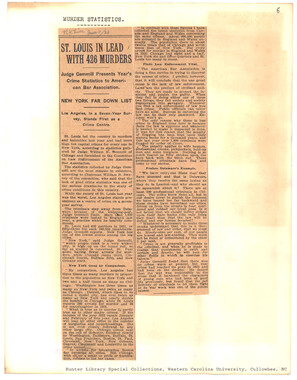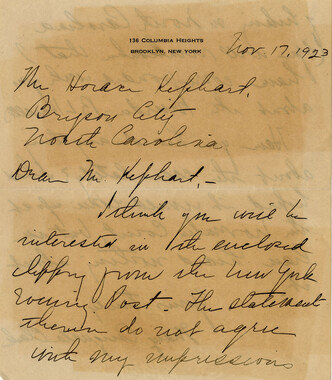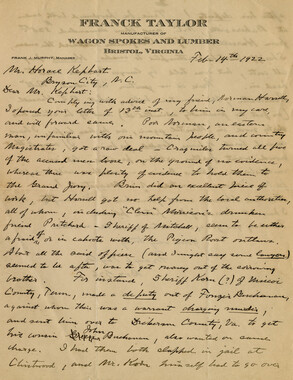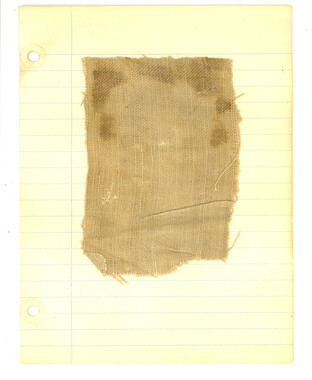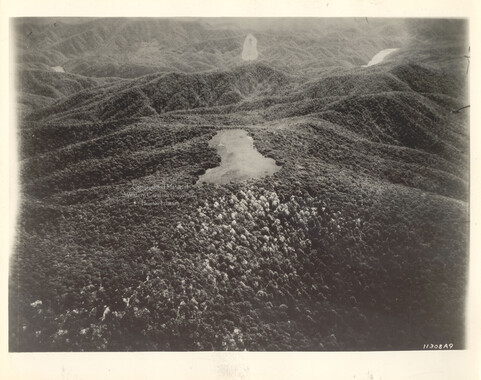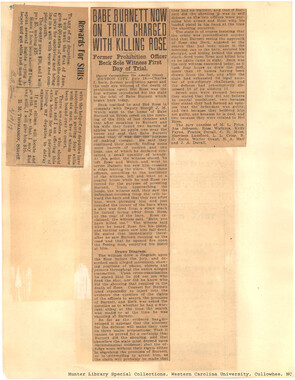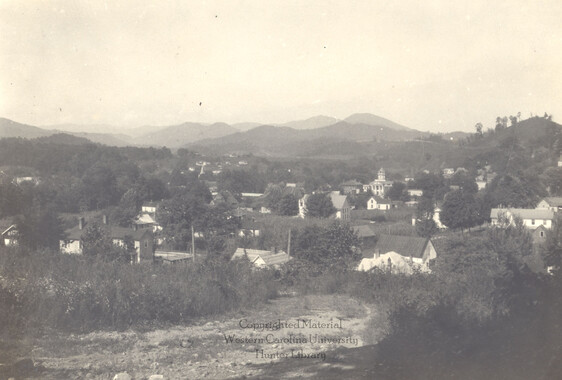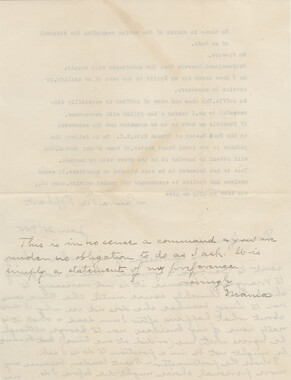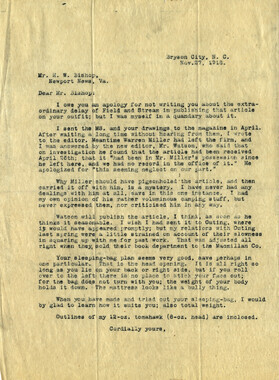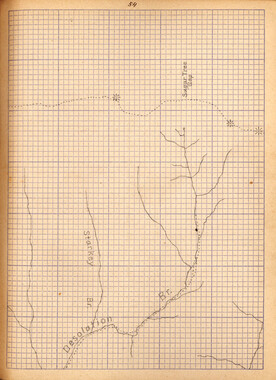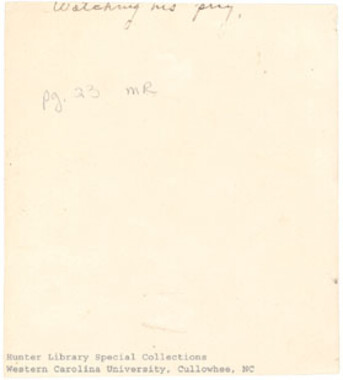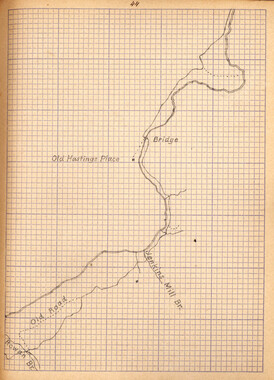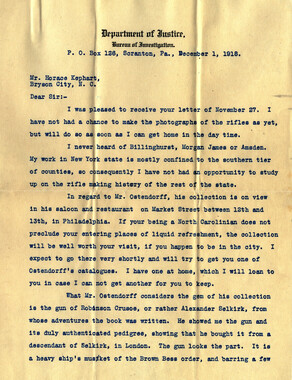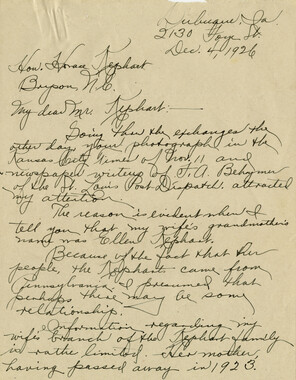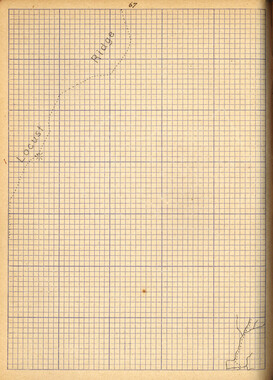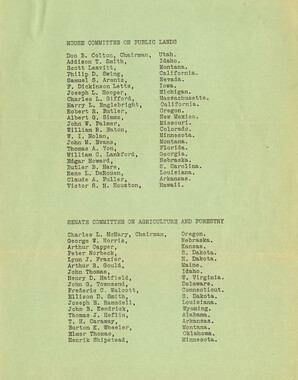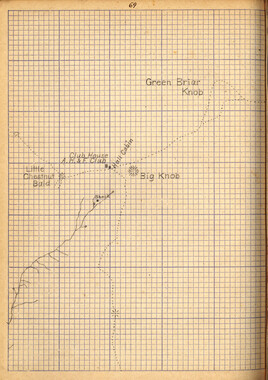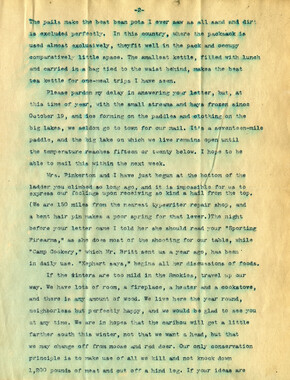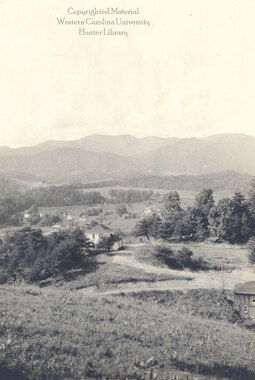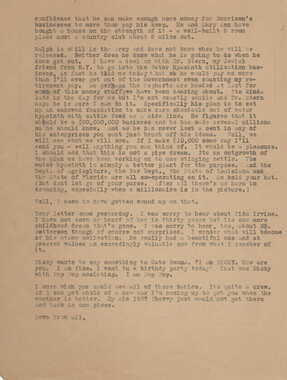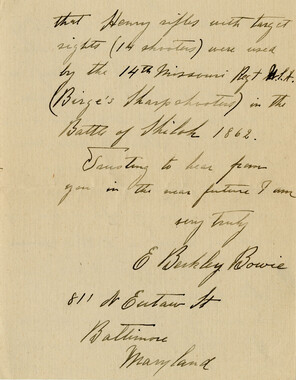Western Carolina University (20)
View all
- Canton Champion Fibre Company (2308)
- Cherokee Traditions (291)
- Civil War in Southern Appalachia (165)
- Craft Revival (1942)
- Great Smoky Mountains - A Park for America (2946)
- Highlights from Western Carolina University (430)
- Horace Kephart (941)
- Journeys Through Jackson (159)
- LGBTQIA+ Archive of Jackson County (85)
- Oral Histories of Western North Carolina (314)
- Picturing Appalachia (6873)
- Stories of Mountain Folk (413)
- Travel Western North Carolina (160)
- Western Carolina University Fine Art Museum Vitreograph Collection (129)
- Western Carolina University Herbarium (92)
- Western Carolina University: Making Memories (738)
- Western Carolina University Publications (2491)
- Western Carolina University Restricted Electronic Theses and Dissertations (146)
- Western North Carolina Regional Maps (71)
- World War II in Southern Appalachia (131)
University of North Carolina Asheville (6)
View all
- Kephart, Calvin, 1883-1969 (15)
- Kephart, Horace, 1862-1931 (290)
- Kephart, Laura, 1862-1954 (39)
- Masa, George, 1881-1933 (1)
- Thompson, James Edward, 1880-1976 (1)
- Weaver, Zebulon, 1872-1948 (3)
- Allanstand Cottage Industries (0)
- Appalachian National Park Association (0)
- Bennett, Kelly, 1890-1974 (0)
- Berry, Walter (0)
- Brasstown Carvers (0)
- Cain, Doreyl Ammons (0)
- Carver, George Washington, 1864?-1943 (0)
- Cathey, Joseph, 1803-1874 (0)
- Champion Fibre Company (0)
- Champion Paper and Fibre Company (0)
- Cherokee Indian Fair Association (0)
- Cherokee Language Program (0)
- Crittenden, Lorraine (0)
- Crowe, Amanda (0)
- Edmonston, Thomas Benton, 1842-1907 (0)
- Ensley, A. L. (Abraham Lincoln), 1865-1948 (0)
- Fromer, Irving Rhodes, 1913-1994 (0)
- George Butz (BFS 1907) (0)
- Goodrich, Frances Louisa (0)
- Grant, George Alexander, 1891-1964 (0)
- Heard, Marian Gladys (0)
- Laney, Gideon Thomas, 1889-1976 (0)
- McElhinney, William Julian, 1896-1953 (0)
- Niggli, Josephina, 1910-1983 (0)
- North Carolina Park Commission (0)
- Osborne, Kezia Stradley (0)
- Owens, Samuel Robert, 1918-1995 (0)
- Penland Weavers and Potters (0)
- Rhodes, Judy (0)
- Roberts, Vivienne (0)
- Roth, Albert, 1890-1974 (0)
- Schenck, Carl Alwin, 1868-1955 (0)
- Sherrill's Photography Studio (0)
- Smith, Edward Clark (0)
- Southern Highland Handicraft Guild (0)
- Southern Highlanders, Inc. (0)
- Stalcup, Jesse Bryson (0)
- Stearns, I. K. (0)
- United States. Indian Arts and Crafts Board (0)
- USFS (0)
- Vance, Zebulon Baird, 1830-1894 (0)
- Western Carolina College (0)
- Western Carolina Teachers College (0)
- Western Carolina University (0)
- Western Carolina University. Mountain Heritage Center (0)
- Whitman, Walt, 1819-1892 (0)
- Wilburn, Hiram Coleman, 1880-1967 (0)
- Williams, Isadora (0)
- 1880s (10)
- 1890s (29)
- 1900s (8)
- 1910s (138)
- 1920s (219)
- 1930s (33)
- 1940s (35)
- 1950s (15)
- 1600s (0)
- 1700s (0)
- 1800s (0)
- 1810s (0)
- 1820s (0)
- 1830s (0)
- 1840s (0)
- 1850s (0)
- 1860s (0)
- 1870s (0)
- 1960s (0)
- 1970s (0)
- 1980s (0)
- 1990s (0)
- 2000s (0)
- 2010s (0)
- 2020s (0)
- Appalachian Region, Southern (69)
- Blount County (Tenn.) (1)
- Buncombe County (N.C.) (5)
- Henderson County (N.C.) (1)
- Jackson County (N.C.) (6)
- Knox County (Tenn.) (2)
- Knoxville (Tenn.) (1)
- Macon County (N.C.) (1)
- Mitchell County (N.C.) (2)
- Qualla Boundary (1)
- Swain County (N.C.) (88)
- Asheville (N.C.) (0)
- Avery County (N.C.) (0)
- Cherokee County (N.C.) (0)
- Clay County (N.C.) (0)
- Graham County (N.C.) (0)
- Great Smoky Mountains National Park (N.C. and Tenn.) (0)
- Haywood County (N.C.) (0)
- Lake Santeetlah (N.C.) (0)
- Madison County (N.C.) (0)
- McDowell County (N.C.) (0)
- Polk County (N.C.) (0)
- Rutherford County (N.C.) (0)
- Transylvania County (N.C.) (0)
- Watauga County (N.C.) (0)
- Waynesville (N.C.) (0)
- Yancey County (N.C.) (0)
- Artifacts (object Genre) (85)
- Clippings (information Artifacts) (15)
- Envelopes (37)
- Glass Plate Negatives (5)
- Letters (correspondence) (366)
- Manuscripts (documents) (273)
- Maps (documents) (3)
- Memorandums (1)
- Photographs (195)
- Portraits (8)
- Postcards (5)
- Publications (documents) (6)
- Aerial Photographs (0)
- Aerial Views (0)
- Albums (books) (0)
- Articles (0)
- Bibliographies (0)
- Biography (general Genre) (0)
- Cards (information Artifacts) (0)
- Copybooks (instructional Materials) (0)
- Crafts (art Genres) (0)
- Depictions (visual Works) (0)
- Design Drawings (0)
- Drawings (visual Works) (0)
- Exhibitions (events) (0)
- Facsimiles (reproductions) (0)
- Fiction (general Genre) (0)
- Financial Records (0)
- Fliers (printed Matter) (0)
- Guidebooks (0)
- Internegatives (0)
- Interviews (0)
- Land Surveys (0)
- Minutes (administrative Records) (0)
- Negatives (photographs) (0)
- Newsletters (0)
- Newspapers (0)
- Notebooks (0)
- Occupation Currency (0)
- Paintings (visual Works) (0)
- Pen And Ink Drawings (0)
- Periodicals (0)
- Personal Narratives (0)
- Plans (maps) (0)
- Poetry (0)
- Programs (documents) (0)
- Questionnaires (0)
- Relief Prints (0)
- Sayings (literary Genre) (0)
- Scrapbooks (0)
- Sheet Music (0)
- Slides (photographs) (0)
- Songs (musical Compositions) (0)
- Sound Recordings (0)
- Specimens (0)
- Speeches (documents) (0)
- Text Messages (0)
- Tintypes (photographs) (0)
- Transcripts (0)
- Video Recordings (physical Artifacts) (0)
- Horace Kephart Collection (729)
- A.L. Ensley Collection (0)
- Appalachian Industrial School Records (0)
- Appalachian National Park Association Records (0)
- Axley-Meroney Collection (0)
- Bayard Wootten Photograph Collection (0)
- Bethel Rural Community Organization Collection (0)
- Blumer Collection (0)
- C.W. Slagle Collection (0)
- Canton Area Historical Museum (0)
- Carlos C. Campbell Collection (0)
- Cataloochee History Project (0)
- Cherokee Studies Collection (0)
- Daisy Dame Photograph Album (0)
- Daniel Boone VI Collection (0)
- Doris Ulmann Photograph Collection (0)
- Elizabeth H. Lasley Collection (0)
- Elizabeth Woolworth Szold Fleharty Collection (0)
- Frank Fry Collection (0)
- George Masa Collection (0)
- Gideon Laney Collection (0)
- Hazel Scarborough Collection (0)
- Hiram C. Wilburn Papers (0)
- Historic Photographs Collection (0)
- Humbard Collection (0)
- Hunter and Weaver Families Collection (0)
- I. D. Blumenthal Collection (0)
- Isadora Williams Collection (0)
- Jesse Bryson Stalcup Collection (0)
- Jim Thompson Collection (0)
- John B. Battle Collection (0)
- John C. Campbell Folk School Records (0)
- John Parris Collection (0)
- Judaculla Rock project (0)
- Kelly Bennett Collection (0)
- Love Family Papers (0)
- Major Wiley Parris Civil War Letters (0)
- Map Collection (0)
- McFee-Misemer Civil War Letters (0)
- Mountain Heritage Center Collection (0)
- Norburn - Robertson - Thomson Families Collection (0)
- Pauline Hood Collection (0)
- Pre-Guild Collection (0)
- Qualla Arts and Crafts Mutual Collection (0)
- R.A. Romanes Collection (0)
- Rosser H. Taylor Collection (0)
- Samuel Robert Owens Collection (0)
- Sara Madison Collection (0)
- Sherrill Studio Photo Collection (0)
- Smoky Mountains Hiking Club Collection (0)
- Stories of Mountain Folk - Radio Programs (0)
- The Reporter, Western Carolina University (0)
- Venoy and Elizabeth Reed Collection (0)
- WCU Gender and Sexuality Oral History Project (0)
- WCU Mountain Heritage Center Oral Histories (0)
- WCU Oral History Collection - Mountain People, Mountain Lives (0)
- WCU Students Newspapers Collection (0)
- Western North Carolina Tomorrow Black Oral History Project (0)
- William Williams Stringfield Collection (0)
- Zebulon Weaver Collection (0)
- Appalachian Trail (6)
- Forest conservation (2)
- Forests and forestry (5)
- Great Smoky Mountains National Park (N.C. and Tenn.) (18)
- Hunting (14)
- Maps (2)
- Mines and mineral resources (3)
- Postcards (1)
- World War, 1939-1945 (4)
- African Americans (0)
- Artisans (0)
- Cherokee art (0)
- Cherokee artists -- North Carolina (0)
- Cherokee language (0)
- Cherokee pottery (0)
- Cherokee women (0)
- Church buildings (0)
- Civilian Conservation Corps (U.S.) (0)
- College student newspapers and periodicals (0)
- Dams (0)
- Dance (0)
- Education (0)
- Floods (0)
- Folk music (0)
- Forced removal, 1813-1903 (0)
- Gender nonconformity (0)
- Landscape photography (0)
- Logging (0)
- North Carolina -- Maps (0)
- Paper industry (0)
- Pottery (0)
- Railroad trains (0)
- Rural electrification -- North Carolina, Western (0)
- School integration -- Southern States (0)
- Segregation -- North Carolina, Western (0)
- Slavery (0)
- Sports (0)
- Storytelling (0)
- Waterfalls -- Great Smoky Mountains (N.C. and Tenn.) (0)
- Weaving -- Appalachian Region, Southern (0)
- Wood-carving -- Appalachian Region, Southern (0)
- StillImage (296)
- Text (647)
- MovingImage (0)
- Sound (0)
Horace Kephart Journal 13
-
Horace Kephart (1862-1931) was a noted naturalist, woodsman, journalist, and author. In 1904, he left St. Louis and permanently moved to western North Carolina. Living and working in a cabin on Hazel Creek in Swain County, Kephart began to document life in the Great Smoky Mountains. He created 27 journals in which he made copious notes on a variety of topics. Journal 13 (previously known as Journal XVI) includes information on crime detection, and criminals. Click the link in the Related Materials field to view a table of contents for this journal.
-
-
Horace Kephart Joumal13 " ( CRIME- - Detection . Last week at dinner she had sat beside Judge Allison in his home and heard him denounce the police in biting tones. He had said that eighty per cent. of all the murderers went uncaught and that less than two per cent. got punished . . " Insight, Wit, Nerve"-the three winning cards in the game of crime-had been Judge Allison' s pronouncement.! Insight to divine the road the pursue ) would take; wit to extri cate one's self when cornered; nerve to play the game through to the end, making no admissions, conceding no points, proclaiming innocence in the fa ce of an army of accusers. J Insight, wit, nerve,- she would have these, because she must have them! _ ( weu-,··ck:~~;,~~;c;,};~-h~d- -~ommitted the murder up in Room 309 in the Palace Hotel. His apparent alibi in the fact that he was taking part in Elaine's performance at the theater at the time when the murder occurred puzzled me for a minute or two; but then I worked it out. He had come on during the first act, but only in the early part of it and not at all in the second. Indeed, his only subsequent appearance had been in one of Elaine's later dances in the third, one that followed my own return from the lobby: He must have dressed after his first appearance and left the theater in his proper person. But his crutch? That was what the loop of cord was for! He could hang it round his neck and button it up under his overcoat. Somewhere between the theater and the hotel he had made the transformation which had just taken place under my eyes. And it was as a hunchback that he walked boldly into the hotel and rode up in the elevator to Room 309. The act showed an almost satanic precalculation that was more horrifying than anything else about it. He must have meant to commit the crime, or at least have foreseen its possibility, when he left the theater with his crutch. But, granting that, it was one of the most perfect things of its kind I had ever heard of. I recalled what Elaine had said that very morning. If you wanted to keep ) people from thinking of one thing you must give them something else to think about. He saw to it that he gave us a hunchback to think about and then went his ways in complete security. _ TTTl. - L 1.- - .J! .J - - · 1- - $'1 . . Finally Bourke drilled - into his apprentice the three cardinal principles of successful cracksmanship-to know his ground th~roughly before ':enturing upon it ; to stnke and retreat wtth the swift precision of a hawk; to be friendless. And the last of these was the greatest. " You're a promising lad " he said-so oi-ten t h at Lanyard would ) almost wince from that formula of introduction- " a promising lad, though it's sad I should be to say it instead of proud as I am. For I've made ye- but for me you'd long since have matnculated at La Tour Pointure and graduated with the canaille of the Sante And in time. you , may become a first-chop operator, whtch I m not and never will be· but if you po,. 'twill be through fighting shy of two l hmgs. The first of them's woman, and the second is man. To make a friend of . a ~an you must lower your guard. Ordmanly 'tls fatal. As for woman, remember this, m' lad: to let love into your life you must open a door no mortal hand can close. And God only knows what'll follow in. " If ever you find you've fallen in love and can't fall out, cut the game on the instant, or you'll end wearing stripes or ?roa? arrows- the same as myself would, -If thts cursed cough wasn't going to be the death of me. No, m' lad : take a fool's advice (you'll never get better) and when you're shet of me, which will be soon I'm thinking, take the lonesome road and 'stick to the middle of it. ' He travels the fastest ~?o travels alone ' is a true saying, but tls only half the truth: he travels the farthest into the bargain. Yet the lonesome road has its drawbacks, lad - it 's damned lonely! " CJ_J.,Y~ SHOESTRING SOLTIES THE GOBEL1N THEFT A LL the French SO.rete had to go by .1'"1. were some fingerprints on the · broken glass of a window in the Versailles Palace and a piece of shoes t r ing found under the window. Never~ n eless , these things led to the .r ecovery . of t'ne Gob elln t a pestries which had been s tolen from the Salon of Mercury and the capture of the thieves . Tl;le detectives compared the fingerprints with those of all employes, but without reryult, and with all criminal r ecords-ran equa lly f utile t ask. Then .t'iley began to use th e shoestring. They ' got a list of the men who, fo r a ny r eason. had been employed on work at the pa lace within one year, and car efully watch ed them. One n amed Prosper Charles was observed to have r ecently repaire11 a shoes tring. They arrested him a nd d iscover ed tha t the piece of shoestrin g they had found came from his shoe. H is fi ng<> J"prints conf irmed thi&. They v is ited his home and there found the two tapest ries, one cut into twelve pieces. ' Vhen t'i11s discovery had been published in the papers the man's sole aclcomp! icc, a bank clerl< n amed Gaston Nouvain , gave h imself up. Both confessed . They had tak en the t a pestries as overzealous parti sans of Moscow. But, having tak en tl1 em, they d:dn't !<.now what t o clo w it~n them, s o they cut one up decifli11g to retum it piecemeal when n obody was looking. • ·' f/lij,.d . Ha~ it turned . out A Solution tha t the latest of New Accepted York's "trunk mys- Too Quickly. t erles " had been solved by the identification of the victim and the arr est of the man who kill ed her , it would have confirmed mapy in the .belief tha t " murder will out" In s pite of all precautions. For, as " the case " stood when the trunk . was first opened, the possibility of e ither identifica tion or arrest s eemed i but slight. As a matter of fact, the only mur ders 1 that come to light are those that-come to light: There cer tainly are othersnobody knows how many-but from the number of people who disappea r every year, never ·to be heard of again, it is probable that the number is consider a ble. Of course. however , not a ll of these vanishings are murders. Another and closely r elated delusion widely current is that murderers always leave evidence of some sort that betrays them to justice. '.rhat they often do is true, and they do it because the majority of killers are of low intelligence, unable to see all the consequences even of. their precautions. But some a re shrewd, If not wise, and some are favored by luck, and so escape. In the present instance, the slayer of the woman was supposed to · have brought the avengers of blood upon himself by trying to fasten the crime on another man a gainst whom he has a grievance. He wanted a double satls -< faction for what he thought his wrong, and his g reed .caused his undoing. So melodramatic was this theory that It excited Incredulity at once, but perhaps it should not h ave done so tor t11ere is melodrama in " real life I, as well as on the stage. Failure Seems Complet e. After more than a m onlli of industrious inv estigation by three groups of . the law's official upholdct·s-and by nobody !wows h ow many~ that a re nonofficlai-.- the E l ~ell case r emalns exactly the mystery It was on the morning of. June 1 l. l()f cour se, the var ious a c tivities displayed have not been without res ults. The\·e has been made known, in the fir st place, a good deal a bout ELWJ,: LL as a m:.Cn and the sort of life he led. This informa tion h ~s not been wit ho. ut Interest of several kinds , but it has n9t b een partic ularly edify\ng or useful. Another consequence of the a ssorted !l)quiries has been the olsclosure of the n.ames, a nd more or less a bout the 1mbits and an1usen1cnts , of sOn1ewherc bet ween a do z~ n and twenty people who a t one t ime or another had been f riends or acquaintan ces of E LWELl-. To some of them tl'c revela tion has been extr emely en1barrassing u..nU to a lt the r est In some l degree unpleasa11t, but from th eir troubling· or a nn oying has con1e n o f a intc:.:;t hint. no w arr anted $Uspicion. a~ to the hlentity or even · tLe ·sex of the person who u ~e d the big a utoma tic with such fata l sldll and then . evanlshed as successf ully as if of air. · And that. so fa r as !mown, Is a ll that has been d on e. The smallness of a cconlpl ishment is . n.ot ~ r e~son, perhaps, for blaming c.r nd:culmg a nybod y, but s ure ly n one ot those enga ged In the investl.; at!on can claim to have earned any &ro'T' 11-t.Y·(/A.o:t~· J..Jil3/st I -- .. 'I DETECTIVES. .~HE REAL SLEUTH ,. r.~ NO STAGE DETECTIVE ·.~ , ·. ·v ,;./ l' . l'•• /1~1 One Makes · Mistakes and Follows Wrong Clues, but the I Other Never Does. •PUBLIC ALWAYS INTERESTED \ I -t• •a ch Citl;z:en Has His Ideal. Criminal Hunte.r ~nd Sometimes It Ia Shattered Rudely. •\ .~ 'l'he detectlve•.fu real Ute and the detective of ftijflb~ and the stage have long been a favArite topic for discussion and comparison' among readers and students of crime. There Is scarcely a. pollee or criminal Investigator of any prominence whose opinion on the subject has not been sollclte\1. "The average citizen," a. detective of national prominence said, " goes through Ute witho~t ever making the acqualnU~. nce of men of my profession. and his knowledge of them Is consequently con' ttned to the type ~e sees on the stage ·or meet'!. In fiction. He Imagines that the I'eal . detective resembles in appeara. nce, cleverness, · a.nd method of worK, the type wltlch has made a strong im; presslon On his mental vision. For ex-. ample. it 'he Is an admirer of Sherlock Holmes, he likes to believe that detectives in real life resemble and poseeaa some of the qualities of that gentleman. On the other hand, neither Sherlock Holmes nor other scientific Investigators of that type may appeal to htm. He 'may prefer, as some do, detectives of the active, vigorous Old Sleuth or Hawk8haw type, and then he sets his standard of detectives i)y th.em. His ldeQ. ot what a detective Is like a.nd should be like 'depends to a. large extent on the mental picture which tor years has been developing In his ImagInation. " He will probably carry this mental picture to the grave with him unle&S something occurs to destroy it. For exa. mple, Mr. Riverside Drive reports to the police the theft of his wlfC:s jewels. A clean cut, sharp -eyed young man calls on him. ;. Mr. Drtve notes with some satisfaction that the young ma.n bears quite a strong resemblance to the detective- he ad ired In a recent crook pley. The d ' 've makes a. painstak- Ing and min 1lmoNl.ndum of the lost jewels, and fi'S Mr. Drive thSit he will do w[ can to recover them. The jewE\ls ">ly through no skill of tlje detect-!· \ found In a pawnshop and retur heir owner, and Mr. Drive som ystifled but el!lited Is convinced· e detective Is every bit as clever a.nd resourceful as his prototype of the stage, and tha~ perhaps detectives on the whole are mOil'e clever than he had imagined. If, however, the jewels were not recovered, If becoming discouraged at the apparent stupidity or l'!xlty of the pollee he had placed the case In the hands of a detective agency with no better result,! Mr. Drive's good opinion of detectives would doubtless . be rudely shattered, and no one could convince him that really clever detectives could be found outside the pages of a book or play. , " Like every other profession there are good, bad, and indifferent detectives. There are, of course, detectives of undeniable cleverness, originality and resourcefulness, and the~e quall!le!l ~m-blned wit a,. power for lt!Ysl llae enabled them to bring to light many a. dark and pu.zzllng mystery. There a.re others who possess few of these qualities :yet accomplish almost as much because they are persistent arid ploddl!l8', and are not easily discouraged by defeat. They IU'll known as good digger$. Like J'oubert the. relentless Chief of Pollee of " Les Mlsera,bles," they persist in stickIng to the trail of a criminal until they have run him down. The average detective, I would say, is no better or worse than the average man In any other profession. A man cannot be a detective very long before his skill and mettle are put to the test. If ne possesses any real br)Jliancy or cleverness It Is sure to come out sooner or leter, since he is given ample opportunity to demonstrate his skill. If he does not possese real talent it Is sure to become known, ~;~.nd he must be classed as a man of mediocre ability. " Detectives as a rule work in a rou- ' tine sort of way. In doing their work they us11ally i"ollow old lind approved methods. There are various ways of catching a thief and these are followed beca.use they have been sanctioned by custom a.nd experience. There are many 4etectlvee who believe !mpllclty that the best way to catch a thief Is with a. thief. This method today has undergone some sllght modifications. The man who assists them In catching a. ! thief need not be a thief If he knows them and their haunts. He Is sometimes a reformed thief. He used to be called a r;;tool' pigeon, but Is now often spoken of as a connection, and a detective who has good connections can often go out and make an arrest where one without connections would not fare so well. Detectives receive much valuable Information from informers. These may. be thlev61! whom they have taken Into custody or well disposed persons whp having a high regard for law and order do not hesitate to Impart to the pollee valuable knowledge which they have re<;el ved. · " Some of the best detectives today are men who through long eJQ>et;lence have come to have a wide knowledge of criminals and their ways. Such a man during an epidemic of •crime Is able to visit places frequented by crooks and recognize old and young offenders. In this ma.nner many a roundup of crooks has been made. Such a detective reI cently stood on a Broadway corner apd In the course of an hour pointed out a dozen men who had fallen Into the tolls of the police at one time or a:nother, and any number of well-known denizens of the underworld. Detectives who through a certain line of work have become specialists In crime acquire a valuable fund of knowledge. For example, take men like Cassassa a.nd McKenna of the• New York Pollee Dep·artment. They have spent so much time trailing pickpockets that they are familiar wltlr the faces of hundreds of them from all over the country, and on occasion they • have rounded ·them up ):ly the scores. It Is tbe s,11.me with detectives of the pawnshOP. •quad. They become familiar with the faces of scores of habitual and petty thieves such as bogus Inspectors, sneak thieves, and second-story men. Detectives of safe and loft squads get to know by sight this class of crooks. " The thieves of today specialize as well as the d~ctlves. For example, a pickpocket usually confines his a.ctlvltles to that line of 'Work; a flat thief will work a flat or an apartment, but as a. rule wm not break Into a store. 1 .A bank burglar-they are seldom heard ot today since the work Is of too desper- 1 ate a character~would disdain to break Into an apartment. To combat an1 a.p- 1 prebend this army dt specialists the pollee must themselveiJ train their men 1 to study the habits of these different classes of thieves. "The· detective In fiction has a signal a.dva.ntage over the sleuth In real lite. It rarely happens that the book or play detective ever aoes the wrong thing at the rlgbt time, whereas th.e detective In rep.! ·life frequently makes mistakes which he Is obliged to correct. The book detective seldom makes the mistakes and I blunders which are made by the real . .(letective. The former often follows 1 clues to a. successful finish which would lead the latter to a false trail. On the 1 other hand, some ot . the experiences of the /';>est known New York detectives , are as strange a.nd startling a.s any In · fiction. ·. "Detective Joseph Petrosino who was shot and killed In Italy some years a.go by members of the Black Hand Society, Clll. one occasion when after a. murderer · ~ted In lt:;tly who had fled to New York, went into a basement In the old • 1 Mulberry Bend section after the fugu\ tlVe. He found himself confronted by thirty-five of the fugutlve's friends, but before they had an opportunity to draw their weaJ>Ons they found !h~mselves looltrng nto 'Cle mu~les or two reo volvers. Scanning their faces carefully he re,cognjzed thlil features of the :man he was after. Calling the murderer by name he commanded him to step to the door, and In another moment he had hiiJ prl10ner·. safely handcuffed and wu . leading him to headquarters. On another occasion Detective Michael FlachetU single-handed rounded up a. band of eight desperate criminals In Ohio. They were convicted and duly punIshed.'' I DETECTIVES. ·DETECTIYB .BUREAU· NOW HAS 700 MEN ___ ...__ ........ ' .I l ( . . ·I I They ~re of Many Typea, Young, Middle-Aged and Old·tlm .. ere In the Service. ' ..l.J::]..£.1 ..l otl\!it• M~i ,love ''.sparkt~rs." liJld If a d!amol)d oes hot spread Its Juster l:rom theh' t ngers It 411 prettt B\lre to "lllne refulgent from the soff to's of their neckties. A detej!tlve may e Bll careless of his dress as to appear most slovenly, but he decorates hlmse with .~ lto~s~~u!:-u~~1lceme~ i\,spire t&. ' It- ~a.qe w e Detective Ute~J.tl "IUtd ook e~~«er forward te t e ~i '!"ben ell' llnlbl on, can be reallll!!d• No be ee" lna.n s taken Into thj bureau Wfio ~ r:et ~terved an appren eesbl);) e,t POll ~ ng th~ v.avements. 1 11. de~tecilvl! lEI o.lit In the bureay he tt\Uil wotk hat' t~~e P~~~~Jeft~h:· trtD'ffi~C i>:t111t';.,th1~:. Yef!.rs, and the detecUv11 ef £odat Is e IU THEIR WORK 18 DIFFICULT rouowlng the rutes tatd dowti b>' n_ • l!pectol' Byrnes e.nd othet neted old thners. They e.re 11ent out to lnveetlge.te ' Squ~." to vlelt pe;wJIShepe, ten<!llll And All of Them Have Served Ap· 'C:~ u~~~ PlB.ee!l whleb lll'l! I1Mgeutl'l It they remain In the bure&U long prontloeehlpe a1 u Pavement enough they are preHt I!Ure to en-pounde-." cou-::~ter adventuree where danger!! Jllld • • thrills a.re pleqtt, but lUI a. rule theft" ' . lives e.re proeal<! enough 11.n-d deYold ot mueh ot the romance trurround.lng tht "'·st •• It takea all 80 ..... ot p-pte· ·to lives ot' the detective ct tlctlol\ and the "" - ·- - SJrlnted page. .A good. pBrl of their time ma.ke a world, so It takea all 110rt8 ot Is taken up_ In l.letenlllll' to complaints detectives to make a detectln bureau. of petty thievery Md to lnvestlga.Ung The clty Detective Bureau, with more S" Jlsaqeeu.e als " that are all too common-than seven hundred men, Ia oomposed of Mr. Jc:r.tea of First .Avenue oomflalna manv types of d t t1 rniddl to the local preclnot ·house the. two • e ec ve-;young; e- n~ar-sllk suits of underwear have van-a~ red and not a tew men who have ·lehed my~erlously from the family &TOwn old and gray In the service. · wash line. It Is a case for the detec. ·Despite the:ro many types, the city has tlves, and one of them mu11t listen to e. well-defined •~pe of detective. He Is u. Mr. Jones's Indignant complaint and '"" make an effort to find the · culprit. Mr. ·man ot M years or more, IS teet 10 Inches Jones Ia a taxpayer and hl ontltled to tall and Ill lnollne4 to stoutness. He has the same att.entlon from the pollee that broe.d shoulders, e. bull neck and Is olean- Mr. Smith ot Riverside Drive, · who has been robbed crt hie wardrobe, receives, shu.ven. Take the average policeman for Mr. Jones's lose ls .as great proporand put him In o1v1Uan olothee and you tlonately a.a Mr. Smlth'il. have the type. · · Men who worked . under Byrnell say It Is the boas~ of experienced orlmlnale that. much of his auooesll "\Va8 due to lhat ~ey can spot e. New York " bull " his wide knowle,dge of criminals ot all the minute they see hlm, and they ha.ve olaeses and their h&Unts. In the old demonstrated their ablUty to do this on day11 the pollee rooelved muoh ln!ormalnnumerable occasions. Cr!mlnale get to . tlon of the underworld a.nd lte charao· know atran.-e pollcemon by Instinct e.na tera from stool pigeons. Inspector by appearance and they are otten sue- Byrnes with countlees " stool I!" workcesstul In spotting them on sight It the Ina- for the de-partment was able to detective happens to belon.- to the city's keep traclc of the movements of a vast well-detlned . type. It Is not 110 easy, number of criminals and to lay hands however, for the criminal to pick out on them when he wanted. He had an .leas familiar types. extreme!;,- wide a.cqua.lnta.nce In the city, An elusive type Is the youn1r detective and cabmen, walters, a.nd frequenters who devotes a. lot ot attention to hie per- of she.dy resorts were always tlppln• sone.l appea.ranoe .. Me.ny of these yountr ll i·n ott about the town's lu.test doings. men have a wea.knesa tor s11lt shirts In the old days many detectives received stylish clothes and ta.noy shoes. Some ol valuable tlpe a.bout ortmtnale from stool them e.re easily mletaken tor colle~re stu- pigeons. dents\... well-paid clerks or professional There ls no denylnt: the fact that demen. ·1·ney are not, however, such slaves tectlve worll Is h~~ord. Detectives often ·to taahlon the.t they cannot cast aside work fol'...houre at a stretch with little their proud raiment .. and don u. woolen or no sleep. It Is u. common experience shirt and a coarse suit of clothes It occa- to work all day and night on a case, slon demands such a disguise. Another and then lnstee.d of turning in for a few type Is supremely Indifferent to dress hours' sleep and rest to spend the bala. nd teels at home only In an old e.nd ance ot the tollowtng morning In court. well-worn suit. The average sleuth likes Pn other occasions they talc:e long and to go about soberly clad. lie he.s a pen- tiresome e.utomoblle or railroad jourchant for dark clothes and e. derby hat. neys, and not Infrequently after daye Although detectives differ In their I and nights on the roe.d they tlnd . to t~U~tes about clothe&, most ot them have their sorrow that they have been folsomething In common; they have e. lowing e. wrong clue or one that leads wea.kness for jewelry. Many sport them nowhertl, as far as the caae Is rlngo-e. dlamoncf ring preferably to any concerned. • enta: - };!0'!00 60 / fliiill- ~ ~ ~- e.-,.._~ 4:. aft:;:;~ nd;;.k; ,...~ .t-"~- ~. ' ~----~~-~~ ........... ·~ ..2-6...:..-~ 4 n.lt n.y.~ ~ ~Off.M-C~~ ..A--~~~~- ~"~;d'I • .J {,! j..,~, /t:)~~~['Jn..-U~~)t ~ A.;.:z:;.;.4-, pf_q.:'f.~- vl:fh ~~-£dti; ~_;;...,~~- ~~'f~";;ti;{~.,v~~ ~,.A~ ~~~ ~,.;..,;....~. . ~ ~~·(41Q<r1/l;)a,_, 1/flt:>>J- /(.l,ll./11.:, 't ~). v;;:., ~ '-- -y";...A 4-.~..-cv~ ~I ,;.A- ~r*• I + \ .. ··· A I \ •' I 63 . I "--=---=-~--- ~~ ~ ~ . ·~J ~ <.> I ' ~ ~ ' it ~. f~ ~ ~~ f ' ~ ~ 't· '} ~ • t i ?- -r P <~ • iJI·t\''). · 1J r. t tP t ~ f.l~£ l:t" t~r ~ r ~ ~~ ~ ~ d~;~ r f t ~ ~: ~;~!,_f:~ ~: ~ ~ ~~~~~vtL. ~ ltht.t ff ~~~f.~ r~t ~ 11~ ! 11 ~t~ft~~ ~ ~~ ~~ i kt~L~tiiJti il~~- 1'~ f;~~)~ , - t ~ ~ t' • ~ • . -~ I ~-,iJ L ~ ~ ~ t ~- ~ ~~ ~ H .~ : . d~~ ~.,\ ~ l ' . ~: h~ &.t ~ ~tJ ~ !itt t;~ t~~,~~;tr ~~~ tnr~t~I t ~~!~ ~t J~s· ~ t hf't l- t_fi Jr . k1 ~til' :~s~~trt~rt. l ~ .r~n t ~ ~ ~ ~ , i. ~· 1 ~ ft"f;~ ~~ 1lt'~} ~~ 1-f. ~ . j; ~g',~Z g ~ }\. . . ~ ~-~lJI·~-~1 r . -}~tt-?t~ ~ . 1}1, .r ~- ~ J· n·~ t~~~ r t;.l ~ *' f.ff~~;>rt· ,. l.t!. F 11 t:. I ~ 1 ' t ~ ~ . 't11/ ~ l d t~ ~ jj.! ~{ . ~ f r.~ e .l ~ . ~lt ;_tiJ k ~ ur.}. . tt, ~!ttl ~ ~tl i l~P ~ "I want to fight too;'/ he said stubbornly. " "We need every man, and I am-rather a good shot. , I do this other because I can do it. I speak their infernal tongue. But it's dirty business at the best, sire." He r remembered to put in the sire, but rather ~ ungraciously. Indeed, he shot it out like a bullet. 1 "Dirty business!" said the King thoughtfully. "I see what you mean. It is, of ' course. But-not so dirty as the things 1 they have do.~e, a!l<;i ar~_doif!.g.:• "P.ay~" he said. ':What is there to pay me With. And what rs the use of reopening the !llatter? A man may be a spy for love of.hrs country .. \Xod knows there is enough lymg and decert m the business. But to be a spy for money-never!" ''rh- ·~~" -6:Jm~~~ • • • • MINGO WITNESS AROUSES M'KELLAR He Reported to Detective Agency While Acting as Union Official. "NOT RIQHT," SAYS SENATOR Operative Got Information From Strikers in Jail While Awaiting Trial for Manslaughter. W ASA:INGTON, July 20.-Aroused by a description of methods used by private detectives In obtaining information about activities of union miners, Senator McKellar, Democrat, of Tennessee, at today's hearing before the committee Investigating di sorders In the Mingo, W. Va., coal field, declared It was not "right " for men to work themselves Into the confidence of union officials and then to report to detective agencies what was going on. C. E. Lively testified that while a member of the United Mine Workers lie served as a Baldwin-Felts Agency.operative in behalf of mine owners. During I the last nine years, he said, he attended conventions as a delegate, all the while making r egular reports to the detective agency. " Do you think It was right and proper to ao a s you did? " Inquired Senator McKellar. When Lively replied he thought It was justifiable, ;;he Tennessee Senator asked whether the miners would have let him Into their meetings If they had known he was 11, dete.ctlve. " Let me In? " Lively retorted. " They ~'k'!,~~ .. havetutned me over to the under- B. D. Avls, Counsel for the operators, remarked that the Department of Justice resorted to the· practice of ha vlng Its agents join unlo~s and other organIza tions to report developments. " I don't care If It does," declared Mr. McKellar. " I don't thlrtk It's the right thing to do. Conduct like that doesn't fit In with my Idea. of American honor. No wonder you're having trouble. In West VIrginia If you're doing things like that." Senator McKellar pressed lively for Information as to whether, when he attended conventions of union miners he collected expenses from both the ml;,ers and the detective agency. Lively said he made It a rule to divide the expenses. · " Oh, I see, You have a. delicate sense of right and wrong," put In SenatoP Ke':'yon, Republican of Iowa. · Lively t estified he kept the fact he was a detective a. secret from coal operators for whom he worked and from union miners with whom he associated until after the battle at Matewan West Virginia, In Ma y, 1920, •ring which ten men, among them seven l3aldwln-~' elts detectives, were killed. The day of the shooting, Lively told the committee, he was at United Mine Workers' headquarters, In Charleston W. Va. When news of the affray wa~ received·, the witness testified almost all " the union men at the h~adquarters " agreed It " was a pretty good thing " and " seemed to enjoy ·it.' One ·man; ·the · committee was told " shook hands. with himself and said It wall the beet news he had heard In a long time.' Lively testified that during the coal strike troubles In Colorado he had gone there as a mine detective. He said he killed a man In self-defense, surrendered and for sixteen months remained In jail, " not wanting a trial.'' While In prison he talked to men jailed for disorder In the strike and made r egular • reports to his agency. After sixteen months, he added, he pleaded guilty to Involuntary manslaughter and wa.gq released. ,.. ,.J'OPICS OF THE TIMES. .,; .f, I · ~:J • • There will be general Opposition approval of the reasons Fully given by the Citizens Justified. Union for opposition to the proposal of Commls'! Jioner ENRIGHT to establish what he calls a " secret service unit," composed of " super-detectives " known only to 1 himself and reporting only to himself, earning their $5,000 salaries In any ways deemed by him to be justifiable In the war against crime and criminals. Such a body, composed of just the right men and operating under just the right supervisor, undoubtedly could r ender Important service In the protec· - tion of society. The finding of such men, however, .would be difficult,. and, If found, they would not do the work for twice the amount suggested, unless they happened to take such Interest in It~ after the manner of detectives ,ln the romances- that salary did not count fO'l' much among their compensations. As to whether or not Commissioner ENRIGHT has the character and lntelUgence required for the proper selection and handling of a. force like this-that is a question into which It is not neces· sary to enter. Certainly we have no assurance that the head of our Pollee , Department always thus will be qualified, and If he were not the uses he ' might make of his unknown agents can be Imagined only with disquietude. The possibilities of corruption and oppression, for anybody who chose to exploit them, would be enormous. Secret Spies Always Obnoxious. Perhaps a. better rea.· son for opposing the " super-detectives " Is the lt:~stlnctlve repugnance In this country to the existence of spies, working under cover and with no responsibility except to a. chief from whom no detailed ac- 1 count1nc tor either the expenditures or the act~ of his agents can be demanded. Amonc the so-called Anglo-Saxon peoples llllch a.gen ts are feared and detested, though it is not dented that they mi&"ht render valuable services in special ca.se8. 'Amorig the peoples called Latin this feeling seemingly is weaker, though the seeming may be due merely to greater familiarity with the Idea. Certainly it is not due to ignorance of the 1 abuses which 9an arise under such a system-of the fact that the secret pollee always have been the favorite tools of arbitrary and despotic Governments. If the disguised spies have not com-mitted crimes essentially greater than those the punishment of which they have facilitated, the balance In their favor cannot be very large. Not infrequently the New York detectives as they are have done excellent work; that there Is among them no Sherlock Holmes Is true, but no surprise need be created by his absence from the force, as he Is purely a creature of Imagination and his procedure by Induction from principles and assumptions to facts would not work In real life. He who pretends to tell what a given human being would do In given circumstances Ignores the confusing fact tha t no two human beings are alike and none Is always the same. · en1redo- ilili'DIS I ,, !· , I Senator Wheeler. I am interested in the fact that \ you made an investigation of different Senators. Mr. Means. Yes. · Senator Wheeler. And among those that you made was one of Senator Bruce of Maryland? ·Mr. Means. No; I wouldn't say that I exactly made an investigation of Senator Bruce of Maryland, Senator. Senator Ashurst. Well, you were asked to make an investigation of Senator Bruce? Mr. Means. Yes. Senator Ashurst. You were asked to 'make an in-vestigation? Mr. Means. Yes. Senator Wheeler. Now, by whom were you asked? Senator Ashurst. Yes; by whom? Mr. Means. I don't recall whether that was Jess Smith, Underwood, somebody up in the Department of Justice, some politician, or who it was. . Senator Wheeler. Now there is only one· general question that I want to ask you, and that is with reference to another specific case. I am not going into the details of it at this time, but will on the next examination of you. And that is with reference-- Last of All, the Investigator Himself Gets It Mr. Means (interposing). I will tell you how you can find out about all these statements, something you can investigate. They have got . my telephone wires tapped. I run three bells on my telephones to be able to tell when they tap them. I can tell in a moment when they tap them, and then I use two telephones. And I know what the average investigator is going to do. He is going to sit down and he is going to listen to the telephone they have assigned him to watch and to tap, and I will get my father-in-law to call up on one, and me on the other, and they can not listen on the . two phones at the same time. When I put three bells on a telephone-electric current won't ring more than three bells; now the moment they tap in and ring in the fourth bell one of your bells will keep quiet ; then you can depend on the fact that your telephone is tapped; I have tapped them myself. I know how to tap, and how to keep from be·ing tapped. But it is going pretty far when they tap a man's wire and keep him from talking to his counsel. ..... Mr. Flagg on Undertakers and Detectives. To the Editor· of The · l\~ew York Tim.es: 71 Most or us ·who are not related to # undertakers look upon that profession with loathing. Ou~ reasons are natural but thoughtless. There is necessity, dignity and beauty in the undertaker's chosen work. But v.·hat of these qu¥tlities is in the work of the detective .w ho n1anufactures criminals? An episode at a hotel the other day was a sample of ,:m,any such despi_cable and apparently legal acts. Two detectives go to the hotel and register as g uests, take a room, order c igars and ginger ale. When the bell boy brings the order he is asked " where is the booze? " He tells these fake guests that they do not serve booze in that hotel. Then t hese Bulwarks or Society cajole this bell hop into fetching red-eye for them from outside. The boy returns with a bottle of Scotch for which he has paid $1;). The Upholders of the Constitution then hand him a summo,ns! These Pillars of Rectitude, the detectives, through bribery and talse representation, have made this boy perform a criminal act. If I were a legislator I would try to have a law ·paased making it i!iegal to a ccept evidence obtained in this manner. Should not the law, that we are all brought up to have reverence for, have something inherently decent about it that '"-e can revere? How are the ends of justice gained by proving that a young lad can be tempted to break the law? '\~' e a re all potential wrong-doers. The undertaker after his grim day's work is over can wash his hands with a feeling that he has done decent work. Can detectives who do this sort of work? The detectives are not fundamentally to blame-it"s the lawmakers. JAMES MONTGOMERY FLAGG. New York, June 14, 1022. --~ • ' I ' t, • • WOl'f!A"N SLEuTH. ------- . ANOTH' .ER~ARRES. -T- I Tbc 'detective asked her to make- a <l.anci! J · f)ngagement. She asked him to call. In ' the meantime she' told DwYer ·and he · · · In tum called on Major wj·nne or the IN. BERGDOLL c· ASE·.. rds~~;t ott~~~"~~~~e~\~~t a~e!n'<'{a~(\.~~~~ - . Bergdoll. Dwyc•· ca!!e<l on he woman, but Gertrude's twin slste•·. Marg,u-et, anted as her substitute and • received the Second Detective Implicated Alleged Plot to DiscreCJit Draft Board. alleged ,;oldler, who never h~ served tn in· the army.· On another occasion one of the s:i;ter~ accomp11nlcd one of the detectives to a l I dan<-. they being shadowed throughout • I the e,·enlng by an automobile <·ontain- 1 ing MaJor Wynne's men. \Vhile th•! j twin sisters were repoJ·ting all the~· · learned to Dwyer, the deteotlves, ac-· cot·dlng to his story, were making glow- TWIN SISTERS AS DECOYS lng reports to Mrs. Bergdoll. - Dwyer charges they lnw•nted an •· affinity" fo1· him, told how this ufflnlty handle.& all the graft money They Led Sleuths on While Report· ing to Their Chief, Object of the Conspiracy. which they said he had received. and told of damaging: admission.~ made by Miss Rua ne, although they ...-ere never <:ertain just which :1-llss Ruane It was' who made the adml'ssions. However, the reports failed to satisfy Mrs. Bergdoll. and she employed another detec-tive. agency . to watch the Bur\lS men. 'The two det<lctives, although unawar I SpE!cial to The New York T\m.e8 .' of It, w<'re being watched from two· · PHtt..ADELPH.IA, I<'eb. 20.-Follow- nngles~by Major Wynne and his meli. In the Interest of the Government, a nd 1 In" the arrest" yesterday of Herman F. by· the othl!r a. !l;ency In the lnterc.Bt of I !))avis, tormer assistant - manager ot Mrs. Ber!l;doll. . the Burns Detecth~e A!l;ettcy, on ·a. Dwyer made It clear that 'the two decharge ot consph·aey to corrupt and In- t ectlves were promptly dismissed by tlmlaate Government witnesses against Wllllam J. Burns as soon as he learnhl Grover Cleveland Bergdoll, the alleged of the nature of the ease, and that the I I dra-ft dodcer. Edward lJyer, a !ormeJ· Burns Agency has since co-oper·ated -~ oper·atlve of the slJ,me agency, was taken Cull~' with Major 'Vynne In perfecting into custory today on a -Jike charge. the , Investigation. ' .Further revelation~ of the plot In wluch --- j ther ~t-re alleged to havll been engaged At the Burns Detective A!,;'ency, in the while In the . t·mploy ot Mrs. Bel guoll 'Voolworth Building, all questions con-were made today by John P. Dwyer. cernlng the BtlrgdoU case we•·e refer• e<i Secretary of Draft :Boaru No. ::2, which to 'William J. Burns, hea d of the bure>eu, Ia brlngmg against Beri'dol\ the draft who left his Scarborough home yesterevaslon charges on which he will be day noon for New York, where he could tried by cou1·t-martlal· at GoveJ·nor's not be found last nlg"ht. Beyond sayIsland, New York, on March o. ing that Mrs. l!:mma Bergdoil· hc.d en- . When delay In the trial of Benrdoll gaged the Burns Agency before he wa s was granted, following his plea of In- re't":ned as her son's civilian attorney, sanity, . he Instructed Captain Bruce H1 •TY ''l'elnberS'er refused· to discuss tile Campbell, his m!lltary counsel, . to In- case yesterday. . . 1 vestl~rate charges . he made that Mr. The board of medical officers detailed Dwyer had -accepted bribes, had ·been by JJieut. ·pen. Robert L<:!e l:lullard, prejudiced against him and that lte had Commander of the' Department of the been called on the telephone b~· Mr. East, to examine Bergdoll with a \'lew Dwyer a year after he had deserted. to determining his sanlt~·. is expected to 'l'he case was accepted bY the Burn:< report either today or tomorrow. D··~ . .Agency In New Yorlt an<l Dwyc1· was Sm\th E;l:v Jelliffe and )